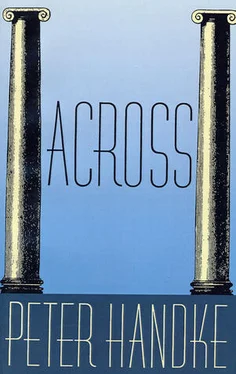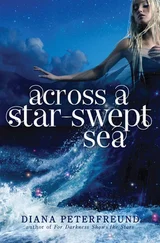Peter Handke - Across
Здесь есть возможность читать онлайн «Peter Handke - Across» весь текст электронной книги совершенно бесплатно (целиком полную версию без сокращений). В некоторых случаях можно слушать аудио, скачать через торрент в формате fb2 и присутствует краткое содержание. Год выпуска: 2000, Издательство: Farrar, Straus and Giroux, Жанр: Современная проза, на английском языке. Описание произведения, (предисловие) а так же отзывы посетителей доступны на портале библиотеки ЛибКат.
- Название:Across
- Автор:
- Издательство:Farrar, Straus and Giroux
- Жанр:
- Год:2000
- ISBN:нет данных
- Рейтинг книги:3 / 5. Голосов: 1
-
Избранное:Добавить в избранное
- Отзывы:
-
Ваша оценка:
- 60
- 1
- 2
- 3
- 4
- 5
Across: краткое содержание, описание и аннотация
Предлагаем к чтению аннотацию, описание, краткое содержание или предисловие (зависит от того, что написал сам автор книги «Across»). Если вы не нашли необходимую информацию о книге — напишите в комментариях, мы постараемся отыскать её.
Across — читать онлайн бесплатно полную книгу (весь текст) целиком
Ниже представлен текст книги, разбитый по страницам. Система сохранения места последней прочитанной страницы, позволяет с удобством читать онлайн бесплатно книгу «Across», без необходимости каждый раз заново искать на чём Вы остановились. Поставьте закладку, и сможете в любой момент перейти на страницу, на которой закончили чтение.
Интервал:
Закладка:
“But,” I said, “would the light and air beyond the borderlines you speak of be so effective, so refreshing, so substantial if not for the dead calm in the center? Without it, would I, in passing from the Old City to the plain, always be overwhelmed by a wave of space? When I stay away from the city, the wave fails me. Doesn’t this suggest that the one sphere makes the other possible? And what better example can there be of how emptiness and superabundance complement each other? I, in any case, need the city and I need it as it is. My place is the center; it, too, takes its measure from outside, from the plain, and then I am its master. Every swarm of tourists that bars my way is welcome to me. The circle I describe around camera-toters starts me on my way to the open meadows; every detour I make in the crowd brightens the country daylight for me. The poet Georg Trakl, who celebrated the ‘beautiful city’—didn’t they all go strolling on the empty plain almost every day? Maybe it’s just that Salzburg should have another name: Charleroi or Taranto, or in a pinch Salinas? Yet salt was once held sacred. It transformed the stranger into an honored guest. Look at a handful of salt crystals under a magnifying glass; those translucent cubes glitter like the walls of a white city, with the crystals strewn farthest from the center as its outworks. Salt is dear to me-to look at, to touch, to season with. It reminds me of my birth and embodies a kind of measure, or law. Once in a Mediterranean salt marsh I saw the ‘house where it was born,’ a stone building on a jetty far out in the water, with an outdoor stairway leading to the entrance on the upper story. In Virgil, salt is always connected with the words ‘small’ and ‘concealed.’ This salt house seemed small and its inhabitants, or so at least I thought, lived in concealment.”
We had stopped at the end of the Mozart Footbridge across the Salzach. At that point the painter asked me my name, which, he said, he hadn’t caught when we were introduced. Then a strange thing happened; without a moment’s hesitation, I said my name was Hurler, and even added: “No, I’m not joking, that’s my real name — Hurler.”
The painter answered in a tone of friendly mockery: “Judging by what you’ve just been saying, it ought to be Spite.” Thereupon he set foot on the wooden bridge. As I remained on the bank below, his eyes were now level with mine. His way of taking leave was to observe that my face reminded him of the boisterous idiots whose forays through the city he would so gladly have joined: “They were my family.” Then he vanished across the bridge. Once, from halfway across, he called back that he wished for my sake that this night’s snow would turn to salt. Reclusive as I was, I then learned something: to look back — the backward glance, as it were.
The footbridge remained deserted. Just once, a couple appeared, the woman wearing a long evening dress under her fur coat, followed by a little girl with braces on her teeth, pushing a bicycle. Under her footsteps, the bridge swayed like a gangplank. The entrance to the bridge with its crossbars looked like a gangway that would be lifted as soon as these people had passed; then no one would be able to board the ship.
The squat, mottled trunks of plane trees came into sight on the opposite bank, lighting up that whole part of the city. On the hither side, brownish slush was splattered by cars, in whose dark interior a white shirt collar could now and then be seen. Accentuated by the swarms of snowflakes, the headlight beams of cars moving bumper to bumper looked like towropes. Here by the side of the shore road, the victim of a traffic accident had once lain, whimpering, clutching his legs to his belly, foaming at the mouth, his teeth chattering; mistaken at first for a “victim” in a first-aid exercise. The swollen but almost soundless river carried whole green bushes along with it. Not a single bell was ringing. In an isolated house on the slope of the Kapuzinerberg, the lights went out one by one. An alarm clock ticked; an ink pad dried. It came to my mind that the name of the road I was standing on was masculine and that of the one on the opposite shore feminine: Rudolfskai and Giselakai. The deserted footbridge was framed on both sides by an iron structure which crossed the river in three arches, hop skip jump. The entrance to the bridge was an arcade, decorated with a climbing plant that made me think of Virgil’s “smiling” acanthus. Here, however, nothing smiled. The bridge gave off the wrong emptiness, not the kind I wanted. For a while, I inwardly kept up my conversation with the painter, at first so intensely that I accompanied it with gestures; then my arms hung motionless and my silent monologue died away. A whiff of perfume came to me from the arcade — from the woman in the evening dress? — and the melting snow dripped and gurgled in the drains. I had had epaulettes of snow, which now quickly vanished.
Though there was plenty of room in the last bus — known as “the drunks’ special”—I stood on the moving disk between the two sections, which turned slightly on the curves. The floor of the long, tunnel-like vehicle rose, fell, and tilted this way and that; an empty beer bottle kept rolling under one of the seats and then out again. The two arms gripping the overhead wires not only conveyed the needed current but seemed also to save the bus and its passengers from sinking into the earth; following their example, I clutched the hanging straps above me with both hands.
It was a short ride; at that late hour, the bus went no farther than the cemetery. By then, I was the only passenger. I didn’t get out until asked to, and then I took elaborate leave of the driver, becoming more verbose from step to step. “Good night, Mr. Chinaman,” said the driver, and started round the circle on his way back to the city.
My housing development was still a long way off; for me, it couldn’t be far enough. For a moment, the bus wires against the open sky veered off in the direction of a suburb in Japan. Shining in the lamplight, the gilt letters on the cemetery gate were an illegible script, or all the scripts in the world combined.
Something drew me westward, across the meadows to the canal. But at the moment that didn’t seem to be my place. I stayed on the main road, which is bordered on the left by the cemetery wall, and as I walked I looked at the distant embankment — on my side of it the Canal Tavern, dark except for a single light in the upper story. The building, another symbol, looked to me like a lock-house.
For a time I was alone on the road and imagined that Loner — like Loser, Hurler, and Spite — was a name. After a while, a man with hobnailed boots came along in the opposite direction and said in a malignant tone: “I know who you are, but you don’t know who I am.” As far as the end of the cemetery wall, I ran. The crematory amid the pines was lit up like some “sight” in the Old City. A yellow glove hung from a branch near the sidewalk. Above the road, the bus wires seemed to be woven into a steel net that wouldn’t move before dawn.
The short stretch where the road rises — the Salzach, which has now been diverted eastward, used to flow here — gave me a chance to breathe deeply and I savored it. Though the former river terrace was not very high, the plain it led to — where the village of Gneis is situated — was definitely a plateau, and here the air was perceptibly colder. There was still snow in the fields, and where the earth showed through, it revealed a pattern resembling bird tracks. The mistletoe balls in the trees had white caps on. Icicles cut through the April foliage and reflected the night light with the clarity of glass. Birds chirped from tree to tree, as though eager to know whether their friends had lived through the storm.
Читать дальшеИнтервал:
Закладка:
Похожие книги на «Across»
Представляем Вашему вниманию похожие книги на «Across» списком для выбора. Мы отобрали схожую по названию и смыслу литературу в надежде предоставить читателям больше вариантов отыскать новые, интересные, ещё непрочитанные произведения.
Обсуждение, отзывы о книге «Across» и просто собственные мнения читателей. Оставьте ваши комментарии, напишите, что Вы думаете о произведении, его смысле или главных героях. Укажите что конкретно понравилось, а что нет, и почему Вы так считаете.












